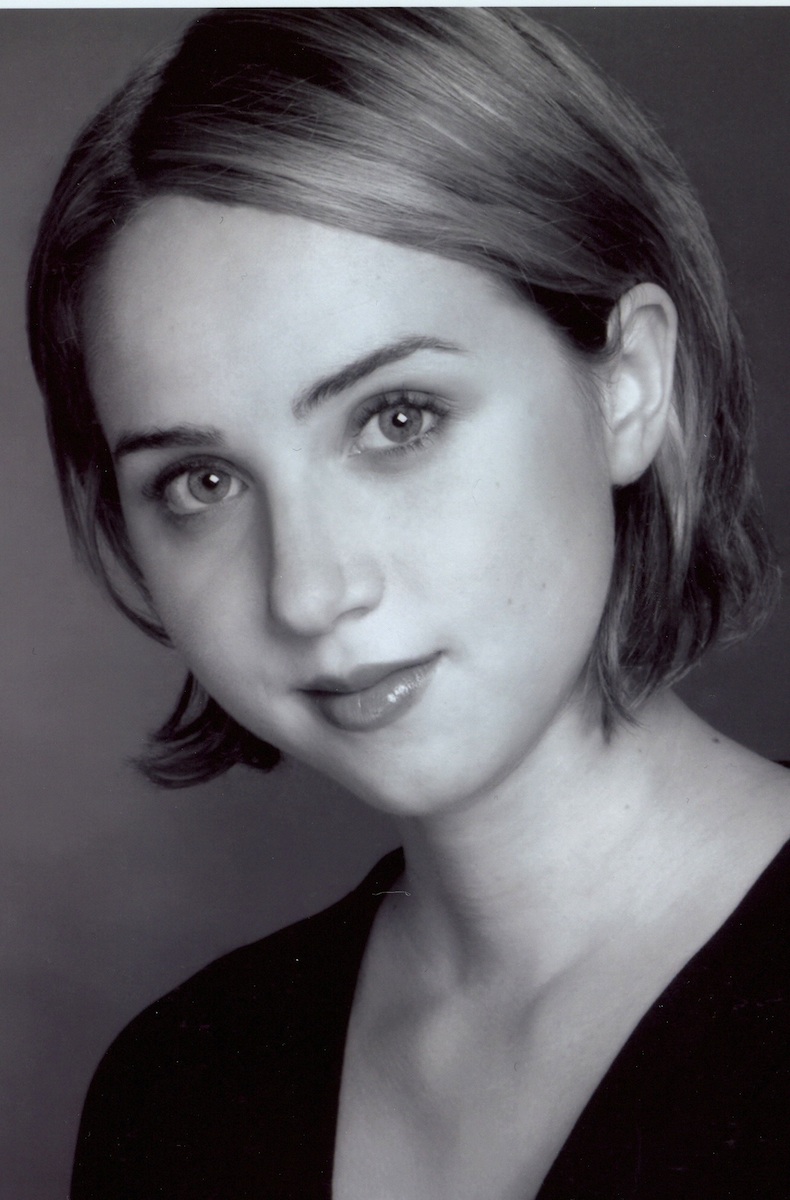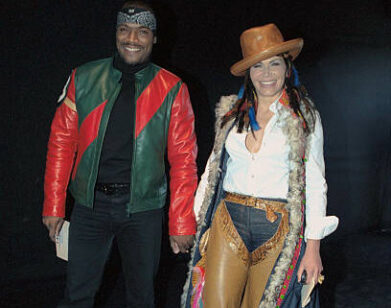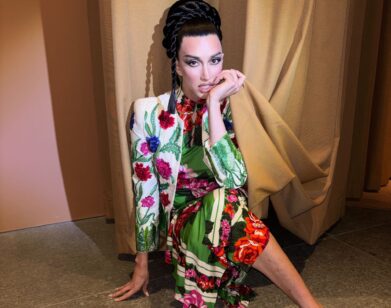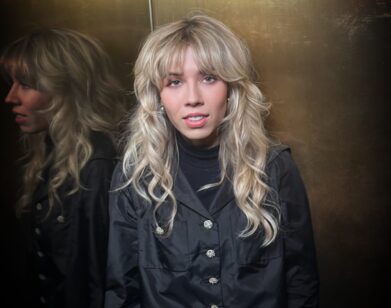The Exploding Girl Blows Up

ZOE KAZAN
Sometimes it seems like there’s a different Zoe Kazan for everyone. Her range of work as an actress reveals so much imagination that it’s easy to latch on. She was Frank Wheeler’s little mistress in Revolutionary Road and a more assured (but still spankable) girlfriend in HBO’s Bored to Death. On Broadway she has starred in A Behanding in Spokane and The Seagull, for which she earned a Drama Desk nomination. On top of it all, she’s an emerging playwright with an upcoming New York debut (and an impressive New York theater pedigree, of course—her grandfather was legendary director Elia Kazan). Kazan’s new play We Live Here, which tackles one family’s turbulent dynamic, just brings us deeper into her creativity.
Before rehearsal, we spoke with Kazan about life lessons, switching between acting and writing, and how she can feel like she’s just playing a game of Barbie.
MERYL CATES: Are you in and out of so many rehearsals right now? Previews for We Live Here start shortly.
ZOE KAZAN: They do start shortly. Yes, we are right in the thick of things—we are in the middle of the woods right now, cutting our way out with a machete. I’m still very much rewriting and in process with these actors, and they’re coming along in their exploration of it. So it’s very exciting. I love being on the other side of the table.
CATES: Let’s talk about the play. It seems like a complex family drama—as family dramas tend to be—so tell me a little bit about it.
KAZAN: It’s about a family, a close-knit family, with a lot of fissures in the surface that are coming together over the weekend of the wedding of the oldest sister. And issues start to come to the surface as old tensions arise. Hopefully, as the title implies, the audience feels like they are being allowed to peek into these people’s homes.
CATES: Well it’s always more compelling to have these emotionally charged, gut-wrenching gatherings offset by a festive atmosphere anyway.
KAZAN: [laughs] Yes, exactly. I mean, hopefully people come and laugh. The play is not like one big sob fest. I find, you know, most people don’t want to be in pain, and don’t want to have a confrontation, and don’t want to have a bad experience. They want the weekend to go well. So in attempting to make the weekend go well, I think there is a lot of humor there.
CATES: So I saw an ad that said, “We can move out. But can we move on?” What inspired the storyline?
KAZAN: Well, I have a sister that I’m very close with, and that relationship is probably the most intense relationship of my life to date, probably of my life, period. I think that when you’re close with a sibling, especially a sister, it’s a relationship unlike any other. So I think that I was interested in exploring all the facets of that. The dark things and the bright things in that relationship, and that’s probably where the first impetus of this came. And then the characters have slowly revealed themselves to me. It’s definitely not autobiographical, but the question that our tagline proposes—which is sort of, “How do we grow up? How do we move on? How do we survive?”—I think is very much on my mind, even coming from a fairly happy house. I think it’s hard to put aside the past and become a grown-up.
CATES: Right, and I think that’s so relatable to everyone.
KAZAN: Yes, I hope so. I think so. I hope so for the sake of my play, and also hope that I’m not the lone 28-year-old person trying to figure out how to be an adult. [laughs]
CATES: If there are two kinds of writers, and this is completely a broad generalization moment here, do you let others comment as you’re writing or do you keep it on lockdown?
KAZAN: I am very much in the instant-gratification camp. I am too much of an actor not to be. I am used to doing my work and having someone comment immediately. So I think that I’m a little hooked on that gratification structure. I don’t like to show it to people for serious feedback very early, though; I like to do a lot of rewriting. So what I tend to do is work all day, and then at the end of the day, corral my boyfriend into reading what I’ve written that day, until we usually say, “Good, keep going.” And I’m like, “What do you mean, keep going?” and he’s like, “Keep going. Where is it going?’ He’s the one sort of putting things in perspective for me. I definitely feel like having that person to check in with is an important part of the process for me.
CATES: So there’s such a talented cast, and Oscar Isaac seems great as the boyfriend kind of laden with secrets. He has that alluring mysterious vibe.
KAZAN: Yeah, definitely.
CATES: It’s a wonderful cast.
KAZAN: The whole cast is amazing. I’m so excited. First of all, this is an ensemble play, so all the roles are important. I think it’s rare to have a cast where all the actors are up to the task. I’m throwing a lot of rewrites, ideas, and feeding off of them. They’re all being incredibly good collaborators.
CATES: Right now you’re also filming your new movie He Loves Me, which you wrote and are acting in.
KAZAN: Yes, I just finished filming that at the end of August.
CATES: There are incredible actors in that too, including Paul [Dano, Kazan’s boyfriend]. How has that been, working together?
KAZAN: You know, it was so challenging. Everyone told us that it was going to be hard, and we’ve worked together before and we’ve worked together really well, but I sort of didn’t realize what it would be like both of us, we’re the two stars of the film, so both of us working as hard as we possibly can, and me with this other hat on. On set, it was amazing every day. We couldn’t have gotten along better, but imagine both halves of a partnership having the same day, every day, and 14-17-hour days and no one is home to cook the meals. [laughs] It was really, really hard, and the most fun thing I’ve ever done.
CATES: [laughs] I can imagine you can write the book on how to work with your man.
KAZAN: [laughs] Well, I’m learning, that’s for sure.
CATES: Is it a totally different process for you, writing for screen and the stage?
KAZAN: Yes, it’s so different, it’s a totally different part of your brain. I mean, I’m learning as I go, and the past year has been amazing because I’ve gotten to work with Sam [Gold] on my play all year doing rewrites and showing them to him, and then work with Jon [Dayton] and Val [Faris] on the movie, on the script all year in preparation to shoot. So I feel like I’ve gotten a definite education about what a screenwriter does and what a playwright does.
CATES: And when you’re working on them at the same time, I would imagine you have to constantly switch gears in your mind and kind of adjust accordingly.
KAZAN: Yeah, last fall was really bizarre, because I was in Angels in America at night and rewriting my play and rewriting my movie, and they were like three totally different parts of my brain that were firing at the same time.
CATES: Sounds like you have a lot going on in your head, but in a good way!
KAZAN: [laughs] It is, it is. It’s funny, I think, when there is a fecundity, when there’s a period of time when you are especially creative, you kind of owe it to yourself to kind of work overtime, and that is what I feel like has been happening to me. My brain has been going twice the speed that my body can go, so I’m trying to keep up.
CATES: You have performed so many different roles and personalities in movies and theater. Does that affect how you write your characters?
KAZAN: I guess a little; it feels like something is moving through you in the same way as it does when the acting is really firing on all cylinders. I sort of surprise myself when it’s really good. You do all the preparation so you can surprise yourself, and I feel like that is sort of more true with writing. You set up the story, but the characters start talking, and they go places that you didn’t expect. You have to follow. When I’m writing, I look like a fool because the parts are moving through me and I’m crying and laughing and making faces. Paul sometimes watches me writing, and he always laughs and breaks me out of it.
I’m definitely feeling whatever’s going on pretty hard. It’s like playing Barbies. You’re holding the Barbies, but all of the action is happening inside of your head. You might be holding them or even speaking out loud, but really, all of the animation is internal. That’s sort of how I feel about my writing. And then the really awful thing is that at the end of the day after crying and experiencing things, then you look at what you’ve written and you’re like, “Hmm, there’s half a page that’s good here.” Then you throw out everything else.
WE LIVE HERE PREVIEWS BEGIN SEPT. 22; THE PLAY OPENS OCT. 12 AT MANHATTAN THEATRE CLUB. FOR MORE ON THE PLAY, VISIT MTC’S WEBSITE.






